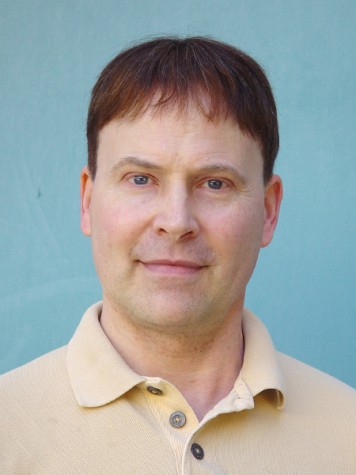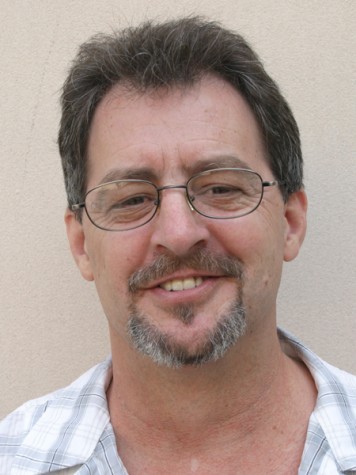Los Angeles Times journalist Héctor Tobar, featured writer of “Once More, Lazarus” in the recently published collection of short stories, “Los Angeles Noir,” spoke to a Kreider Hall full of prospective writers – both students and faculty – on Oct. 20.
GCC’s warm applause delighted Tobar, 47, who received a Pulitzer Prize for journalism for his street reporting of the Rodney King riots of 1992. He spoke about the art of writing in different genres and then answered questions about his writing techniques.
“Los Angeles Noir,” edited by Denise Hamilton, comprises eclectic works that typify the detective stories of the noir fiction genre. Tobar explained how Hamilton had asked him for a short story, so he adapted an existing story to fit the genre by inserting a “hard-boiled” detective.
The book is being used in several English classes, and the students and faculty from several English, history, and journalism classes had good reason to pay attention. Tobar revealed valuable insights. “I want to know the nuances of definitions,” he said explaining why he had amassed a collection of dictionaries. “I’m crazy about writing.”
Tobar was born of a blue-collar Guatemalan immigrant family living in a section of East Hollywood that is now called “Little Armenia.” A sociology graduate of UC Santa Cruz, Tobar started out writing for a free weekly journal in San Francisco, was later accepted into the Times’ minority summer internship program known as Metro, and once an L.A. Times reporter, advanced from suburban desk all the way to Mexico City bureau chief before accepting a weekly column here in L.A. He explained why he once quit his job at the L.A. Times. It was to get his master’s degree of fine arts in creative writing from UC Irvine.
Reading, learning new vocabulary, and doing creative exercises are good ways to improve one’s writing. To improve his high school SAT scores, Tobar had studied the book “Word Power Made Easy” (1949) by Norman Lewis.
When he was writing a novel about Latinos, he compiled a list of 500 synonyms for “brown-skinned” such as “cinnamon-skinned” and “the complexion of a newly minted penny.”
“Back in my 20s, I tried to use a word I had never used before in each of my articles,” he said. “Prolix” [overly wordy], for example, was one of the words he submitted in an L.A. Times article, but it was rejected for being too esoteric [obscure, or mysterious].
“Good vocabulary is gained by reading good literature,” he said. Before revising his second novel, which had been rejected by 40 different publishers, Tobar spent two years reading Shakespeare, the one great writer he had managed to avoid.
“Who’s the master of the family drama?” he asked himself when writing a story about a family: “Anton Checkov.” So he read “The Cherry Orchard.”
Whenever and wherever he goes and has an inspiration, Tobar is ready to jot it down on anything including automatic teller slips and restaurant receipts.
Audience member, George Sarkissian, 29, with a master’s in English said that Tobar’s first novel “Tattooed Soldier” (2000) reveals “a skilled wordsmith whose sentences have a natural flow. Tobar pays attention to structure, and as an ethnic writer, he presents a world lived at the margins of society.” Being a journalist had forced Tobar to go out into the world and see things he wouldn’t have seen otherwise.
To write his second book to be published, “Translation Nation: American Identity in the Spanish-Speaking United States” (2006), Tobar criss-crossed the nation sharing what it was like to be a member of the largest minority in the U.S. A monument to literary non-fiction, the book was at first a slow seller but has since found wide recognition.
GCC history instructor Kristin Leaf, who published an article about “Los Angeles Noir” in a recent issue of GCC’s online staff newsletter “Chaparral,” was moved by Tobar’s “great and utterly prosaic [factual], practical, usable, understandable advice.” His talk has inspired her to work on completing her doctoral dissertation.
Leaf said in her article that Tobar’s revised short story “Once More, Lazarus” contains moral lessons. Yet because the genre is noir fiction, the road, for example, to learning “a valuable lesson about guns” for character Daniel José Cruz Jr., 14, who inadvertently shoots himself in the head on three separate occasions, will be “convoluted, tragic and fraught-through with ambiguity.” In other words, the L.A. noir environment is an unusual medium through which to administer lessons of morality.
Much of Tobar’s skill as a reporter was easily transferable into the realm of fiction. While working as an L.A. Times police reporter, national correspondent, and foreign correspondent to Buenos Aires and then Mexico City, Tobar witnessed many scenes and interviewed many characters. “I had all these stories in my head-stories that couldn’t fit in the newspaper,” he said.
Tobar was happy to explain the writing process involved in converting into fiction the characters and scenes he had encountered on the job. For example, he had interviewed homeless migrants and a mother-daughter prostitution team. Why not simply change their names and use their circumstances and mannerisms in his fiction?
To bring a fiction scene to life, Tobar contacted an ornithologist for the names of birds such as scrub-jay that one would expect to find chirping in L.A. on a July dawn. Facility with adapting non-fiction into fiction is the sign of a capable writer.
Tobar said that besides studying the style of the greatest authors, it’s important to research the historical background of a period when writing a novel. He constantly kept his second novel with him wherever he went in order to revise it properly. It had taken him two years to write it but “six or seven years to revise.” His thorough revision paid off when the novel, entitled “The Barbarian Nurseries,” was recently bought by publisher Farrar, Straus and Giroux. It is due to be released in 2011.
One important tip for revising one’s work is to see it with fresh eyes such as by putting it aside for a day or two so as to forget what one has already written.
The accomplished Tobar is now in the midst of his fourth book, a literary non-fiction work about the 1970s experiences of Eagle Scout Joe Sanderson who leaves Urbana, Ill. in his 20s to go around the world backpacking, charming women, working for the Red Cross during the Civil War in Angola, and joining a guerrilla army in El Salvador.
To write this literary non-fiction work based on Sanderson’s journal and letters home, Tobar said he must “get inside the protagonist’s head and describe the way he sees things.”
After a brief period of questions and answers, a line of students formed for book-signing. Everyone seemed to be carrying a new optimism for improving his or her craft with the new-found tools acquired at this providential lecture by a true master.
Besides being a “public intellectual” newsman and short story writer, Tobar is a skilled novelist and literary non-fiction writer.
“I’ve spent my life trying to create writing that is really impactful and beautiful,” said Tobar.


